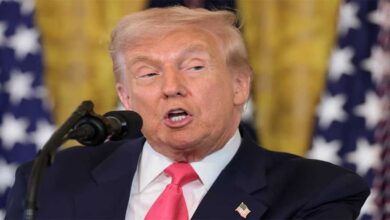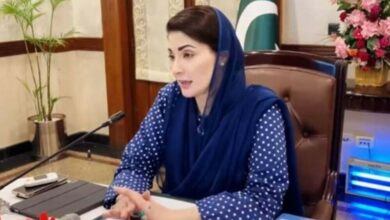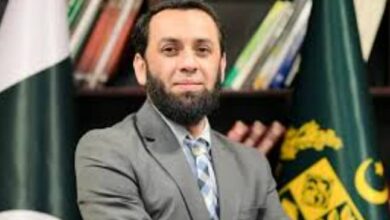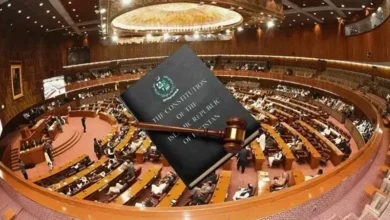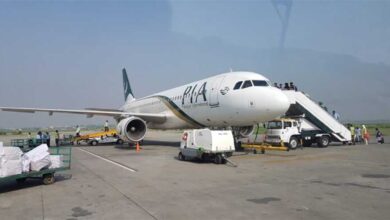The temperature in Sukkur on Friday at lunch, when Prime Minister Imran Khan came to put the federal government’s largesse on display, was a sweltering 34 degrees. Much further down south, in Karachi, however, it was virtually subarctic—the stalactitic outcome of a political frigidity between the Centre and Province.
The prime minister was visiting for the first time since he was elected three years ago. Surely, the head of Sindh’s government should have received him? But Murad Ali Shah was conspicuous in his absence as chief minister on stage as the PM handed out checks to the young people of upper Sindh.
This visit was to inaugurate the Kamyaab Naujawan Program and the PM was accompanied by his A-team, Sindh Governor Imran Ismail and many of his ministers, including Shah Mehmood Qureshi, Fehmida Mirza and Asad Umar.
The prime minister’s entire speech focused on how miserable the province was. “Interior Sindh is Pakistan’s poorest area,” he said. Its people did not have the basic necessities of life. Its police were unjust. People were living in the toughest circumstances. A stinging indictment of the administration if there ever were one. (And someone needs to tell him not to keep using the Moen jo Daro yardstick… it’s grown really old by now.)
And it was beyond Imran Khan why the Sindh government did not give the NoC for the federal government projects on Bundal and Buddo islands, off Karachi’s shore, for big real estate plans. The provincial government had shot itself in the foot because Imran Khan had hoped they would attract foreign investment. But perhaps the Sindh government would give it another thought. And the federal government will continue to spend money on this part of Pakistan. The PTI government had not been able to focus on Sindh because it had been busy fighting mafias in Punjab. But now it was going to work on a Rs446 billion package that would be on the ground in a month’s time.
Mere minutes after the prime minister’s speech concluded in Sukkur, Murad Ali Shah’s key lieutenant Murtaza Wahab’s press conference began. You didn’t need to be a political scientist to predict this maneuver. Sindh had to respond to the slights.
“Welcome, Prime Minister sahib, you came to Sindh,” Wahab said in tones of chilled saccharine iftari Rooh Afza. “Heard you have announced a development package of Rs426 billion. I would like to remind you all… this is not the first time that Imran Khan has announced a package for Sindh, or a city of Sindh.” In March 2019, he came to Karachi and announced a Rs162 billion package for it. “It’s been over two years, but no one from Karachi has seen the package in reality.”
Wahab went on to list projects he said that the federal government had promised but which did not materialize. In March 2019, Rs1 billion mobile health units for Tharparkar, a public sector university inaugurated with the MQM allies. “The first quarter of 2021 has passed and the people of Hyderabad are still waiting for that university,” said Wahab. “According to my information, its charter hasn’t been approved yet. I think its name should have been Hyderabad Imaginary University.”
The barbs kept coming, with some a little below the belt, including a cheap potshot on the prime minister’s name. “He has not fulfilled a single announcement. That’s why I’m forced to suggest another name for the captain, Ailaan Khan (Announcement Khan),” said Wahab.
According to Wahab, fire tenders came due to the efforts of former mayor Waseem Akhtar, with money set aside by Shahid Khaqan Abbasi. Wahab scoffed that the entire PTI cabinet came toreceive them. It has been two years but the Green Line BRT is nowhere near ready. The federal government said it would take over mega water supply project K-IV (which is a 22-year mess by the way).
“If you look at his 22-year-struggle,” Wahab went on to say, “you would see that his interest in Sindh shows only in Ramazan every year. Because in Ramazan, he comes to Sindh’s capital Karachi and leaves after taking donations for his hospital. He’s the first prime minister of the world who asks for donations while in power.”
Anyone watching television on Friday afternoon then, would have been treated to the political equivalent of a mudfight. It was the latest expression of hatred between the two sides in a two-year cold war.
The Great Freeze actually started off between Sindh Governor Imran Ismail of the PTI and the PPP-led Sindh government, according to SAMAA TV political reporter Sanjay Sadhwani, who has covered it extensively. The governor is Imran Khan’s representative in Sindh, or the federal government’s man to put it simply. That sets the dynamic up as PTI vs PPP, which has the majority here. It began when the Sindh government would send its bills for the Governor to sign into law after the assembly had passed them. He would refuse, thereby frustrating the PPP’s lawmaking.
For example, in May 2019, the Sindh Assembly MPAs voted and passed a bill to do away with a 158-year-old police law and bring in reforms to the force so its officers are more accountable and come under less political pressure. But Governor Imran Ismail did not sign the change into law and instead returned the bill to the assembly, saying it did not achieve reform. (Replace the Police Act of 1861 and revive the Police Order 2002).
Then the two sides locked horns over Police IG Kaleem Imam in January 2020. There was disagreement over who should replace him. Sindh recommended some names but PTI allies were not on board.
Then Covid hit and on the very day Imran Khan announced he would not be imposing a lockdown, the Sindh government declared its own defiant lockdown. The PM gave his speech at 3pm that day and Murad Ali Shah hit the airwaves at 4:30pm. Then an entire year under the pandemic was fraught with squabbles over statistics, beds, meds, protocols, hospitals.
For an independent observer with no skin in the game, these openly aggressive press conferences laced with sarcasm, denunciation and name-calling just appear to widen the rift. Sindh would like to pursue its own agenda and the federal government, for all its power, does not seem to want to play an enabling role or meet it half way. Given the language used in Sindh, it is clear its political leaders are in no mood to either budge.
Sadly, no conciliatory or mature voices from veteran politicians have been heard either. And so, for a while now, the positions appear to be becoming even more intractable.
As for the people of Sindh, who should be ideally served by their elected governments at home and at the Centre, it appears that they are the ones who are being left out in the cold.





